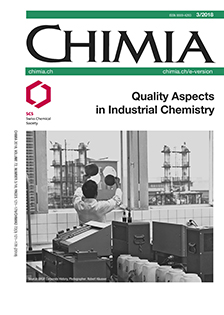Recent Regulatory Trends in Pharmaceutical Manufacturing and their Impact on the Industry
DOI:
https://doi.org/10.2533/chimia.2018.146Keywords:
Alcoa, Data integrity, Elemental impurities, Exposure limits, Ich q3dAbstract
The pharmaceutical industry is one of the most regulated industries in Switzerland. Though the concept of good manufacturing practises (GMP) was implemented for chemical production in the early 1990s, the rules and regulations for our industry are in constant evolution. In this article we will highlight the impact of these changes to the industry using three recent guideline up-dates as examples: the implementation of ICH Q3D 'Guideline for elemental impurities', the EU-GMP Guideline Part III Chapter 'Guideline on setting health based exposure limits for use in risk identification in the manufacture of different medicinal products in shared facilities' from 01. June 2015, and the new guidelines to data integrity such as 'PIC/S 041-1 Good Practices for Data Management and Integrity in regulated GMP/GDP environments'. These examples show how scientific approaches help to modernize the control strategies for our products and increase product quality for a better patient safety. The requirements of data integrity regulations are also of interest to industries and universities not working under GxP requirements as they also support the business to improve data quality (traceability) for patent applications, and reduce risk of data falsification.Downloads
Published
2018-03-30
How to Cite
[1]
D. Tabersky, M. Woelfle, J.-A. Ruess, S. Brem, S. Brombacher, Chimia 2018, 72, 146, DOI: 10.2533/chimia.2018.146.
Issue
Section
Scientific Articles
License
Copyright (c) 2018 Swiss Chemical Society

This work is licensed under a Creative Commons Attribution-NonCommercial 4.0 International License.







